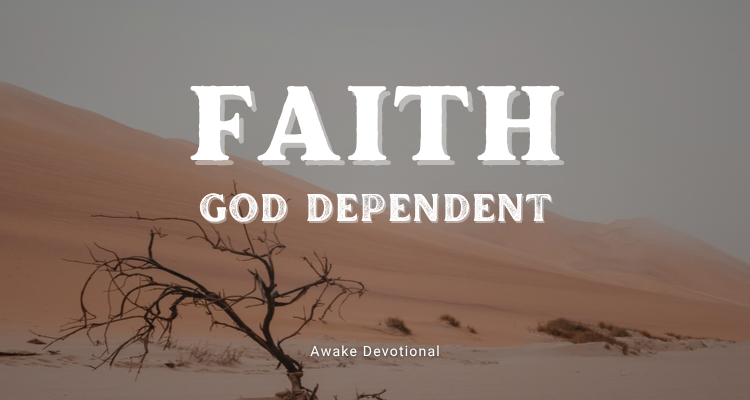
Faith: God Dependent
Romans 4:20-21
We have often heard of a faith that moves mountains. However, we must understand that faith is not a one-sided reality. People talk about faith that calls things into existence. Faith that works miracles. But that is not all that there is to faith. Faith also submits to the will of God and His sovereignty. This will sometimes mean patiently and obediently waiting on the Lord.
Both expressions are biblical faith, and the believer must learn to hold on to both to have a complete picture of what faith truly is. Faith is not always about having what you say, when you say it; sometimes, it’s about patiently waiting and walking with God toward a promise for decades, just like Abraham did.
If faith is only validated by dramatic displays of God’s power, then what happens when the mountain doesn’t move?
When the storm doesn’t calm?
When the answer doesn’t come immediately?
If this is our concept or idealization of faith, one that is only worth acknowledging when it gives instant results, then we are wrong. Because true faith also endures storms. It is not just about miracles and manifestations; it is about trust, obedience, and dependence, even when things are contradictory.
We often call Abraham the father of faith. However, when we examine the life and story of Abraham, we find that the kind of faith he has is different from what we often celebrate today. The Bible said Abraham was given a promise but he waited many years for the fulfillment. The journey of Abraham’s life was not marked by instant answers or immediate results. It was marked by waiting, patience, obedience in the face of uncertainty, and even honest questions. The faith of Abraham did not eliminate his struggles. His faith sustained him through them.
In Genesis 15:2, Abraham said,
“Lord GOD, what will You give me, seeing I go childless, and the heir of my house is Eliezer of Damascus?”
A question that reveals his weariness and reminds us that faith is not the absence of questions, but the presence of trust even while asking them. He wasn’t doubting the existence or power of God; one could argue, he was trying to reconcile the reality of his present with the promise of his future.
But just a few verses later, in Genesis 15:6, the Bible says, “And he believed in the LORD, and He accounted it to him for righteousness.”
Here’s something interesting to note in Abraham’s life:
In Genesis 12:4,
“So Abram departed as the LORD had spoken to him, and Lot went with him. And Abram was seventy-five years old when he departed from Haran.”
Genesis 17:1 then says,
“When Abram was ninety-nine years old, the LORD appeared to Abram and said to him, ‘I am Almighty God; walk before Me and be blameless.’”
And finally, in Genesis 21:5,
“Now Abraham was one hundred years old when his son Isaac was born to him.”
From the time God gave him the promise to the time Isaac was born, about 25 years passed. That’s a long time to hold on and keep walking, especially when it looked like nothing was changing.
Abraham obeyed. He left his country. He walked with God. He made mistakes: he tried to figure it out on his own, but ultimately, he stayed in his relationship with God. He continued on that journey. This is what faith is about; having a continued walk with the Lord even in the face of challenges, choosing to obey God even when what He has promised feels far.
Hebrews 11:8 says,
“By faith Abraham obeyed when he was called to go out to the place which he would receive as an inheritance. And he went out, not knowing where he was going.”
Romans 4:20-21 says,
“He did not waver at the promise of God through unbelief, but was strengthened in faith, giving glory to God, and being fully convinced that what He had promised He was also able to perform.”
And you would wonder: He did not waver? The same Abraham who was asking God questions in Genesis 15?
Yes, because biblical faith is the posture of a heart that leans towards God, even when the flesh or the body feels weak.
Biblical faith is persistent trust, even when the flesh struggles to understand or yield. Faith is still lifting hands in prayer when your heart is heavy. Faith still says, “Yes to Your will. Thy will be done,” even if you have been waiting for long.
So how can we depend on God when everything around us feels contradictory?
We hold on to what He has said. We remember His character. We remember that He is sovereign and He is a good father. We remember that He is El roi, He sees us. So we rest in the assurance of His unchanging nature.
Hebrews 10:23 says,
“Let us hold fast the confession of our hope without wavering, for He who promised is faithful.”
This is such a powerful way to understand this. The Bible says to hold fast, not because we are strong, but because faithful is He who has promised.
Biblical faith is faith that is hinged on the integrity of God, not on your ability to be so strong that the strength of your will can bend the hand of God. Biblical faith is faith that can hold on even when things seem wrong.
This is the kind of faith that the men of old, such as Abraham, had. And this is the kind of faith that you are to emulate — walking a life and a journey with God, where you know that the Lord has spoken this, and faithful is He who has given this promise.
Let your faith be characterized by persistent dependence on God through both storms and delays, choosing obedience and trust in all situations.
Prayer Point
Father, help me to never waver in your promises, even when situations seem bleak. Help me to always trust in your nature and ability, regardless of how circumstances appear.
